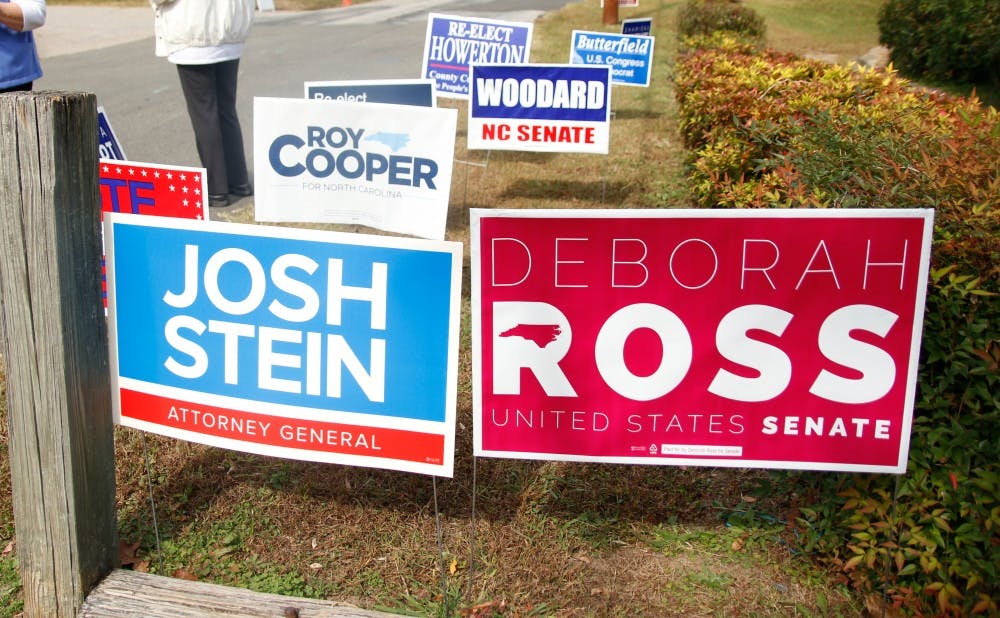As the race for the Senate heats up, the differences between North Carolina's Republican incumbent Richard Burr and Democratic challenger Deborah Ross are becoming more and more pronounced.
Ross, a former member of the North Carolina General Assembly and a former Duke Law professor, is battling Burr in one of the tightest Senate races in the country. The candidates' voting records, public statements and previous legislative actions indicate drastic differences in policy.
"[Burr] tends to be a fairly popular incumbent and has been relatively removed from the [House Bill 2] thing going on around here," said John Aldrich, Pfizer-Pratt university professor of political science. "He generally gets good marks for his work in Washington, and she is not particularly well known, so I expected that he would have a relatively easy re-election. Not simple, but relatively easy."
Part of the reason he believes that Ross now strongly challenges Burr may be because Burr "did not jump into the race with real enthusiasm," and that this gave Ross a chance to get established as a serious candidate before Burr started seriously campaigning.
The Chronicle took a look at how Burr and Ross compare in regards to this election's hottest topics.
Burr and Ross have a very different stances on reproductive rights. Burr has voted to forbid human cloning for reproduction and medical research. He also voted in favor of banning partial birth abortions and voted against a $100 million initiative to reduce teen pregnancy through education and contraceptives.
Ross has voted in favor of allowing Affordable Care Act state exchanges to provide abortion services and has been a strong advocate for allowing abortions in any circumstance during the first two trimesters. Ross previously introduced the Equal Pay Act in 2013 to address the disparity in wages between the sexes—women in North Carolina are paid 85 cents for every dollar paid to men.
Key to Burr's re-election campaign has been his foreign policy credentials. Like many Republicans, Burr opposes the Obama administration's Iran Deal—as a "foreign policy disaster." He has previously voted "against "permanent normal trade relations" with China.
Burr has mixed votes on free trade agreements—he has voted in favor of implementing free trade agreements with Central America, Australia, Singapore, and Chile. But he has voted against a deal with Oman, has opposed trade deals with China and is critical of the Trans-Pacific Partnership.
Deborah Ross has not been as outspoken as Burr regarding foreign policy issues—likely because she has only maintained a seat in the North Carolina General Assembly and has not held national office. However, she has been an ardent opponent of the Trans-Pacific Partnership, like her opponent.
Regarding marriage rights, Burr previously voted in favor of a state amendment to limit marriage to heterosexual couples, but Ross has been a steadfast advocate for same-sex marriage.
The candidates' voting records on environmental issues show stark differences as well.
Burr previously voted in favor of barring the Environmental Protection Agency from regulating greenhouse gases and has voiced opposition to cap-and-trade, a government attempt to control pollution by creating economic incentives in a "pollution permit" market. Burr also voted to reauthorize the Land and Water Conservation Fund, which helps protect North Carolina land for public use.
Ross voted for the Renewable Energy and Efficiency Portfolio Standard in 2008 which states that North Carolina's utilities must obtain a certain percentage of their energy from clean or renewable resources and energy efficient programs.
Burr, who has an "A" rating from the National Rifle Association, has appealed to North Carolina residents concerned with limitations of their Second Amendment rights. He voted in favor of prohibiting foreign and United Nations aid that would restrict gun ownership and voted yes on a bill that would prohibit civil liability actions from being taken against gun manufacturers due to their products being misused. Burr also was strongly opposed to legislation that would prohibit high capacity magazines containing more than 10 bullets.
Deborah Ross has supported what she calls "common sense" gun safety and background checks and has voiced concerns about concealed carry of weapons in parks and restaurants.
Burr has advocated for defunding, repealing and replacing ObamaCare with free market healthcare options. On the other hand, Ross has supported the expansion of state Medicaid through the Affordable Care Act's provisions.
David Rohde, Ernestine Friedl professor of political science, noted that Ross' lack of experience compared to Burr has been a challenge for her.
"She has never held state-wide office, she has never run state-wide before, she is not an incumbent in anything and that’s what also limits her visibility to the electorate," he said. "That is not surprising given the fact that she is a challenger."
Aldrich said that typically the incumbent has an advantage due to being more well-known, but that this year, ties to Trump may leave Burr vulnerable.
"You may know about the incumbent, but you don’t know about the challenger, and so the role of party and the president in terms of swinging the vote becomes more consequential," Aldrich said.
Rohde echoed this sentiment, noting that Ross' "main strength" is that she is running in a year when the top of the Republican ticket is weaker in the state than it has been in other years.
He explained that Burr's greatest strength as an incumbent is that has been involved in creating legislation that appeals to the electorate and is willing to indicate publicly through ads about what he has done as a senator so far.
But campaign advertising about voting records is not as widespread as it once was.
"Lots of people don’t watch broadcast television anymore or watch it much more rarely than they used to, so they may be much less likely to encounter attack ads from each side," Rohde said.
Get The Chronicle straight to your inbox
Signup for our weekly newsletter. Cancel at any time.

